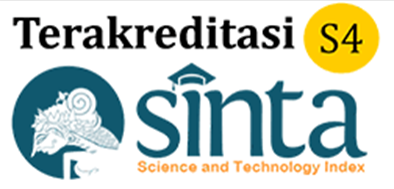Analisis Sentimen Menggunakan Support Vector Machine Sebagai Tools Evaluasi Layanan Sipraja Mobile
Abstract
E-government is one of the government's strategies to implement good governance through the use of technology to improve public services. The realization of e-government is done through the provision of web-based and mobile services by the Sidoarjo Government by releasing the Sidoarjo People's Service System (Sipraja). Sipraja is an application that integrates administrative services in villages and sub-districts. Sipraja mobile has been downloaded by more than 100,000 users, received more than 2,000 reviews, and received a review rating of 4.2. However, user review ratings sometimes do not match the format of the review text provided. This study aims to get an overview of public perceptions / sentiments towards Sipraja mobile services to be used as evaluation material. Research was conducted to analyze user reviews of the Sipraja mobile application on Google Playstore using the Support Vector Machine (SVM) algorithm and linear kernel type. The research model used is able to produce an accuracy rate of 75.10%, precision of 80.36%, specificity 81,97%, recall of 68.70% and F1 score of 74.07%. From the research results, public sentiment towards Sipraja mobile services is more inclined to positive sentiment of 54.84% However, negative sentiment has a similar amount of 45.16%. The Sidoarjo local government's attention and follow-up is needed to continue to meet the objectives of e-government to improve services to the community.
References
Alipour, S., Di Marco, N., Avalle, M., Etta, G., Cinelli, M., & Quattrociocchi, W. (2024). The drivers of global news spreading patterns. Scientific Reports, 14(1), 1519. https://doi.org/10.1038/s41598-024-52076-6
Alita, D., & Shodiqin, R. A. (2023). Sentimen Analisis Vaksin Covid-19 Menggunakan Naive Bayes Dan Support Vector Machine. Journal of Artificial Intelligence and Technology Information (JAITI), 1(1), 1–12. https://doi.org/10.58602/jaiti.v1i1.20
Alsaeedi, A., & Zubair, M. (2019). A Study on Sentiment Analysis Techniques of Twitter Data. International Journal of Advanced Computer Science and Applications, 10(2). https://doi.org/10.14569/IJACSA.2019.0100248
Dania Siregar, Faroh Ladayya, Naufal Zhafran Albaqi, & Bintang Mahesa Wardana. (2023). Penerapan Metode Support Vector Machines (SVM) dan Metode Naïve Bayes Classifier (NBC) dalam Analisis Sentimen Publik terhadap Konsep Child-free di Media Sosial Twitter. Jurnal Statistika Dan Aplikasinya, 7(1), 93–104. https://doi.org/10.21009/JSA.07109
Denny, M. J., & Spirling, A. (2018). Text Preprocessing For Unsupervised Learning: Why It Matters, When It Misleads, And What To Do About It. Political Analysis, 26(2), 168–189. https://doi.org/10.1017/pan.2017.44
Dianingtyas, A., & Roekminiati, S. (2024). Evaluasi Pelayanan SIPRAJA dalam Pengurusan Data Penduduk di Kecamatan Taman Sidoarjo. Jurnal Ilmiah Manajemen Publik Dan Kebijakan Sosial, 8(1), 58–79.
Dunn, W. N. (2018). Public Policy Analysis: An Integrated Approach (sixth). Routledge.
Fauziah, N. (2024). Analisis Sentimen Publik Terhadap Kenaikan Tarif PPN di Indonesia dengan Pendekatan VADER. Jurnal Akuntansi Dan Keuangan, 12(2), 228. https://doi.org/10.29103/jak.v12i2.16796
Gunawan, D., Riana, D., Ardiansyah, D., & Akbar, F. (2020). Komparasi Algoritma Support Vector Machine Dan Naïve Bayes Dengan Algotima Genetika Pada Analisis Sentimen Calon Gubernur Jabar 2018-2023. Jurnal Teknik Komputer, 6(1), 121–129. https://doi.org/10.31294/jtk.v6i1.6866
Hamid Asnawi, M., Firmansyah, I., INovian, R., & Septiani Pontoh, R. (2021). Perbandingan Algoritma Naïve Bayes, K-NN, dan SVM dalam Pengklasifikasian Sentimen Media Sosial. Prosiding Seminar Nasional Statistika, 10, 20.
Koto, F., & Rahmaningtyas, G. Y. (2017). Inset lexicon: Evaluation of a word list for Indonesian sentiment analysis in microblogs. 2017 International Conference on Asian Language Processing (IALP), 391–394. https://doi.org/10.1109/IALP.2017.8300625
Liu, B. (2012). Sentiment Analysis and Opinion Mining. Springer International Publishing. https://doi.org/10.1007/978-3-031-02145-9
Muzaki, A., & Witanti, A. (2021). Sentiment Analysis Of The Community In The Twitter To The 2020 Election In Pandemic Covid-19 By Method Naive Bayes Classifier. Jurnal Teknik Informatika (Jutif), 2(2), 101–107. https://doi.org/10.20884/1.jutif.2021.2.2.51
Pemerintah Daerah Sidoarjo. (2018). Peraturan Bupati Sidoarjo Nomor 46 tahun 2018 tentang Tata Kelola Teknologi Informasi dan Komunikasi Menuju Smart City di Kabupaten Sidoarjo.
Rahardi, M., Aminuddin, A., Abdulloh, F. F., & Nugroho, R. A. (2022). Sentiment Analysis of Covid-19 Vaccination using Support Vector Machine in Indonesia. International Journal of Advanced Computer Science and Applications, 13(6). https://doi.org/10.14569/IJACSA.2022.0130665
Rina. (2023, June 12). Memahami Confusion Matrix: Accuracy, Precision, Recall, Specificity, dan F1-Score untuk Evaluasi Model Klasifikasi. https://esairina.medium.com/memahami-confusion-matrix-accuracy-precision-recall-specificity-dan-f1-score-610d4f0db7cf
Sadiq, S., Umer, M., Ullah, S., Mirjalili, S., Rupapara, V., & Nappi, M. (2021). Discrepancy detection between actual user reviews and numeric ratings of Google App store using deep learning. Expert Systems with Applications, 181, 115111. https://doi.org/10.1016/j.eswa.2021.115111
Saputra, D. P., & Widiyarta, A. (2021). Efektivitas Program SIPRAJA Sebagai Inovasi Pelayanan Publik di Kecamatan Sidoarjo Kabupaten Sidoarjo. JPAP: Jurnal Penelitian Administrasi Publik, 7(2). https://doi.org/10.30996/jpap.v7i2.4497
Setiawan, I. (2019, September 25). Permudah Layanan, Pemkab Sidoarjo Luncurkan “Sipraja.” Antaranews.Com. https://jatim.antaranews.com/berita/320356/permudah-layanan-pemkab-sidoarjo-luncurkan-sipraja
Setyawan, A. C. (2024). Enhancing Public Service Delivery through Digital Transformation: A Study on the Role of E-Government in Modern Public Administration. Global International Journal of Innovative Research, 2(10), 2439–2453. https://doi.org/10.59613/global.v2i10.340
Sihombing, E., Halmi Dar, M., & Aini Nasution, F. (2024). Comparison Of Machine Learning Algorithms In Public Sentiment Analysis Of TAPERA Policy. International Journal of Science, Technology & Management, 4(5), 1085–1098. https://doi.org/10.46729/ijstm.v4i5.1162
Suwidyanti, N. (2023). Peran Good Governance Melalui Reformasi Birokrasi Dan E-Goverment Guna Meningkatkan Penyelenggaraan Pemerintahan Berbasis Kinerja Di Kota Surabaya. Publik: Jurnal Manajemen Sumber Daya Manusia, Administrasi Dan Pelayanan Publik, 10(2), 530–543. https://doi.org/10.37606/publik.v10i2.560
Syahronny, M., Rochim, A. I., & Murti, I. (2024). Analisis Penerapan E-Government Pada Aplikasi Sistem Pelayanan Rakyat Sidoarjo (Sipraja) Di Desa Prambon Kecamatan Prambon Kabupaten Sidoarjo. PRAJA Observer: Jurnal Penelitian Administrasi Publik (e- ISSN: 2797-0469), 4(06), 55–62. https://doi.org/10.69957/praob.v4i06.1675
Velmurugan, Dr. V. S. (2023). Effect of the internet on library and information services. International Journal of Computing, Programming and Database Management, 4(1), 16–19. https://doi.org/10.33545/27076636.2023.v4.i1a.77
Vizmanos, J. F., Siar, S., Albert, J. R., Sarmiento, J. L., & Hernandez, A. (2023). Like, Comment, and Share: Analyzing Public Sentiments of Government Policies in Social Media. https://doi.org/10.62986/dp2023.33
Wu, X. (2024). Consumer Behavior Changes in the Digital Marketing Environment and Their Impact on Marketing Strategies. International Journal of Global Economics and Management, 4(1), 513–520. https://doi.org/10.62051/ijgem.v4n1.61
Yanchuk, T. (2023). Application of Internet Marketing Technologies in Marketing Activity of Enterprise. Problems of Innovation and Investment Development, 30. https://doi.org/10.33813/2224-1213.30.2023.9
Copyright (c) 2025 Jurnal Manajemen dan Ilmu Administrasi Publik (JMIAP)

This work is licensed under a Creative Commons Attribution 4.0 International License.












